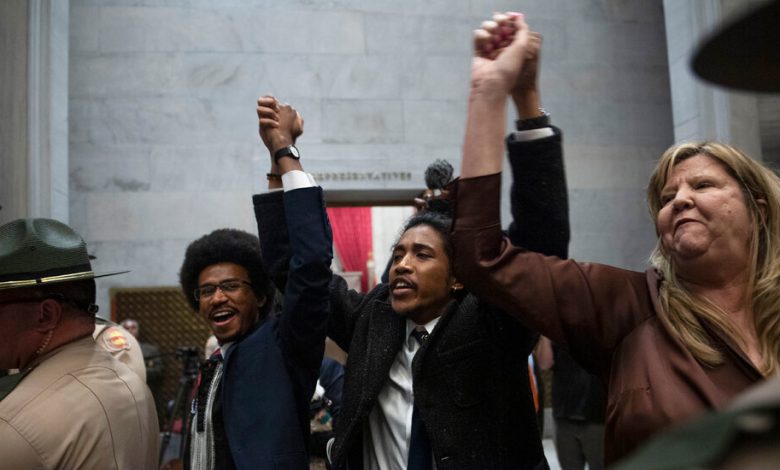As Young People March for Their Lives, Tennessee Crushes Dissent and Overrides Democracy

NASHVILLE — Yesterday the eyes of the country were on the indictment of a former president, along with the all too real possibility that political or public chaos would erupt as a result. Here in Tennessee, we were watching a different kind of chaos unfold as our state government doubled down on its love affair with guns, even in the immediate aftermath of a horrific school shooting. I wish I could tell you that guns were the worst of it.
Last Thursday, in the wake of the shooting, peaceful protesters at the Tennessee State Capitol rallied for gun reform. Activists waved signs in the statehouse gallery, and Representatives Justin Jones, Gloria Johnson and Justin J. Pearson, all Democrats, led them in chants from the House floor during breaks. Between bills, the lawmakers also approached the podium to speak. They did not wait to be formally recognized.
On Monday, statehouse Republicans stripped all three of their committee memberships and deactivated their ID badges. The Democrats “did knowingly and intentionally bring disorder and dishonor to the House of Representatives,” the formal resolutions against them read. Tomorrow, the House will vote on whether to expel the three lawmakers for talking out of turn.
Expulsion is extremely rare in Tennessee history. As the Politico reporter Natalie Allison pointed out on Twitter, the Tennessee House didn’t even vote to expel a Republican legislator who had been accused of sexually assaulting three teenage girls.
The resolutions against Mr. Jones, Ms. Johnson and Mr. Pearson were filed against a backdrop that highlights the absurdity of the actions Republicans have taken against them.
On Monday at 10:13 a.m., one week to the minute after a shooter armed with military-style weapons entered the church-affiliated Covenant School and murdered three children and three adults, more than 7,000 Nashville students staged a walkout to demand gun reform. It was a sight to behold: Vanderbilt University students marching down one street, Belmont University students marching down another, all of them joining a large crowd of high school and college students from around town. They were determined to speak as one voice directly to their government — to the only people with any power to reduce the risks they take just by going to class.
No place in this firearm-besotted country is safe from gun violence, but Tennessee students are at particular risk, and not just in school. They live in a state with some of the nation’s most permissive gun laws, as well as the highest rate of gun theft — and perhaps unsurprisingly, one of the highest rates of gun deaths.
The guns that killed the children and staff members at Covenant last week were all purchased legally, despite the fact that the shooter was being treated for an emotional disorder. If Tennessee had enacted a red-flag law before now, it’s fair to believe that six deeply mourned members of the Covenant community would still be alive. Countless others would be, too.
Until yesterday, when the judiciary committee of the State Senate voted to postpone all gun-related legislation — including a red-flag law jointly proposed by Senator Jeff Yarbro and House member Caleb Hemmer, both Democrats — the Tennessee General Assembly showed every sign of turning Nashville’s school shooting into an opportunity to weaken gun safety in the state even further.
The shamelessness on display was breathtaking. “If there is a firearm out there that you’re comfortable being shot with, please show me which one it is,” a Republican state representative said to student protesters. Presumably he meant that banning assault-style guns wouldn’t prevent students from being shot with other kinds of guns, but that’s not much of an argument coming from a pro-gun legislator who opposes red-flag laws.
These repeated demonstrations for gun safety legislation were the context in which the Republican supermajority of the Tennessee House moved to expel Mr. Jones, Ms. Johnson and Mr. Pearson from the statehouse. But the three Democrats had more than public sentiment on their side. They had more, even, than moral authority on their side. They also had a practical reason for flouting chamber rules: “Our mics were cut off throughout the week whenever we tried to bring up the issue of gun violence,” Mr. Jones told WKRN.
Ms. Johnson is a retired teacher and veteran legislator who represents parts of Knox County in East Tennessee, but the two men are new to the General Assembly. In a special election this year to replace a House member who died in October, Memphis voters elected Mr. Pearson in a landslide. Mr. Jones represents a district in Nashville. After winning the Democratic primary, he ran unopposed in the November election.
Both men are skilled community organizers. Mr. Pearson led the successful effort to stop the Byhalia Connection Pipeline from running through a historic Black neighborhood in Memphis. Mr. Jones led the successful effort to have a bust of the Confederate Gen. Nathan Bedford Forrest removed from the State Capitol.
Disenfranchisement of liberal voters is nothing new in the state of Tennessee, but what the G.O.P is trying to do to these Democrats goes well beyond disenfranchisement. To remove legitimately elected officials from the chamber to which voters sent them — and to do so precisely because those officials were representing the wishes of voters — is nothing short of authoritarianism. And the Republican supermajority in the Tennessee General Assembly has the votes to do it.
Still, I can’t help but hope that Tennesseans will protest the precedent their leaders are about to establish. I still have hope that voters, even Republican voters, will contact their legislators today, in time to make at least some of them stop and reconsider what they are poised to do.
What Tennessee Republicans may think of Mr. Jones, Ms. Johnson and Mr. Pearson is far less important than what Tennessee Republicans may think about American democracy. Because democracy does not exist in a state where officials can be sent home for nothing more than voicing the opinions of voters who are pounding on the statehouse door, demanding to be heard.
In fundamental ways, none of this is surprising. Twenty-first-century Republicans are always demonstrating a truth that the Roman historian Tacitus understood back in the first century: It is part of human nature to hate someone you have hurt. In refusing to expand Medicaid, in attempting to replace public schools with private charters, in disenfranchising Democratic voters, in persecuting L.G.B.T.Q. citizens and demonizing school librarians, in stripping bodily autonomy from Tennessee women and in failing to protect us all from gunfire, they are telling us exactly how they feel about the people they represent.
My real hope lies in people like Justin J. Pearson, Gloria Johnson and Justin Jones. Whatever happens to them at the hands of their fellow legislators tomorrow, we have not heard the last from them. Of that I have absolute confidence. The shining example of the great John Lewis, who cut his own teeth opposing injustice in Nashville, taught them how to cause “good trouble.” Clearly, they have learned from the master.
Margaret Renkl, a contributing Opinion writer, is the author of the books “Graceland, at Last: Notes on Hope and Heartache From the American South” and “Late Migrations: A Natural History of Love and Loss.”
The Times is committed to publishing a diversity of letters to the editor. We’d like to hear what you think about this or any of our articles. Here are some tips. And here’s our email: [email protected].
Follow The New York Times Opinion section on Facebook, Twitter (@NYTopinion) and Instagram.





